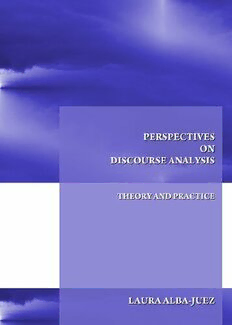
Perspectives on Discourse Analysis: Theory and Practice PDF
Preview Perspectives on Discourse Analysis: Theory and Practice
Perspectives on Discourse Analysis: Theory and Practice Perspectives on Discourse Analysis: Theory and Practice By Laura Alba-Juez Perspectives on Discourse Analysis: Theory and Practice, by Laura Alba-Juez This book first published 2009 Cambridge Scholars Publishing 12 Back Chapman Street, Newcastle upon Tyne, NE6 2XX, UK British Library Cataloguing in Publication Data A catalogue record for this book is available from the British Library Copyright © 2009 by Laura Alba-Juez All rights for this book reserved. No part of this book may be reproduced, stored in a retrieval system, or transmitted, in any form or by any means, electronic, mechanical, photocopying, recording or otherwise, without the prior permission of the copyright owner. ISBN (10): 1-4438-0597-1, ISBN (13): 978-1-4438-0597-1 For Gustavo, Joaquín and Julian TABLE OF CONTENTS Acknowledgements....................................................................................ix Introduction.................................................................................................1 Chapter One.................................................................................................5 Introducing Discourse Analysis Chapter Two..............................................................................................25 The Data Chapter Three............................................................................................45 Pragmatics Chapter Four..............................................................................................79 Interactional Sociolinguistics Chapter Five............................................................................................109 Conversation Analysis Chapter Six..............................................................................................133 The Ethnography of Communication Chapter Seven..........................................................................................155 Variation Analysis and Narrative Analysis Chapter Eight...........................................................................................177 Functional Sentence Perspective: Thematic and Information Structures Chapter Nine............................................................................................207 Post Structuralist theory and Social Theory Chapter Ten.............................................................................................235 Critical Discourse Analysis and Positive Discourse Analysis viii Table of Contents Chapter Eleven........................................................................................265 Mediated Discourse Analysis Chapter Twelve.......................................................................................289 Further Issues in Discourse Analysis References...............................................................................................323 Key to Self-Evaluation Questions...........................................................347 Practice Key............................................................................................355 Conceptual Index.....................................................................................393 ACKNOWLEDGEMENTS No present book on Discourse Analysis can boast of not having drawn on previous works on the subject. In this respect, I owe a special debt to all the authors whose work is cited or discussed in this book, and I hope not to have misrepresented any of them. In particular, my personal consultation with some of these researchers was of the greatest value and assistance. Thus my thanks go to: 1) Bruce Fraser, for generously sharing his work on discourse markers with me and for sending me his unpublished manuscripts. 2) Deborah Schiffrin, Deborah Tannen, Robin Lakoff, Heidi Hamilton, William Labov, Wallace Chafe and John Gumperz for clarifying many of my doubts about their approaches to discourse while I was a Visiting Researcher in the Linguistics Department at Georgetown University (U.S.A.). 3) Angela Downing, for being such a good teacher, and for generously giving and discussing with me some of her articles on coherence, thematic progression, topicality and discourse markers. 4) JoAnne Neff, for her perennial openness and her willingness in sending me her articles on political discourse, as well as for shedding light on my understanding of Critical Discourse Analysis during our conversations and discussions. 5) Teun van Dijk, for clarifying many of my doubts about Critical Discourse Analysis and the topic of ideology, by gently answering all my questions after one of his talks at my university, the UNED. 6) Irene Madfes, for sending me her articles on medical discourse. My students of Discourse Analysis along the years have helped me with their comments and suggestions to try to provide clearer and more detailed explanations of certain topics, as well as to include a wider variety of sample analyses of the different phenomena discussed in the book. My sincere thanks go to them too. I am especially grateful to my friend and colleague Gretchen Dobrott, for her thorough, detailed and invaluable work in proof-reading the manuscript. María Teresa Gibert also revised the manuscript and I
